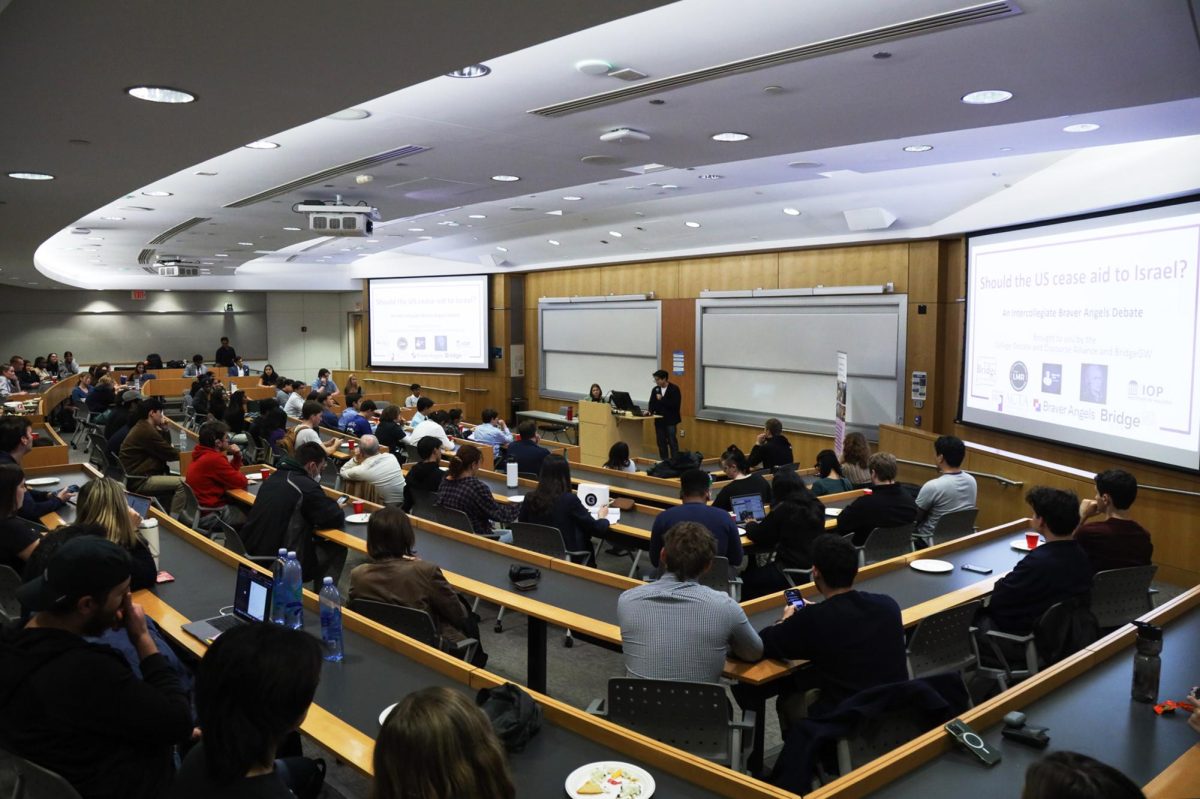Updated: Oct. 28, 2024, at 10:57 p.m.
More than 75 students from universities across the D.C., Maryland and Virginia region gathered in Duques Hall Thursday night to discuss whether the U.S. should cease aid to Israel.
Students from GW, University of Maryland and Georgetown and George Mason universities on both sides of the debate took turns sharing why they believe the U.S. should or should not continue funding Israel as it continues its military campaign in Gaza. BridgeGW hosted the conversation in collaboration with the GW Institute of Politics, Left Middle Right and the GW Alexander Hamilton Society, a nonpartisan student-led foreign affairs organization.
Moderator Sadie Webb from the American Council of Trustees and Alumni allotted students four minutes to voice their opinions on aid to Israel. After the four minutes, she allowed two to three audience members to question each speaker’s views before moving on to the next speaker. Eleven students spoke in total.
Webb structured the conversation as a parliamentary debate, meaning audience members addressed the moderator when asking a question and referred to the presenter as “the speaker.”
The first speaker, a GW student, spoke first in favor of ceasing aid to Israel and said that as a finance major, he doesn’t understand why the U.S. spends money on global aid while U.S. citizens face financial strains.
“What the U.S. government is doing, is saying ‘Great, let’s send billions to Israel and Ukraine,’” she said.
Grant Aung, another GW student, spoke next in favor of continuing aid to Israel. He said there is “no doubt” that Israel has the right to defend itself from attack.
“Neither side can claim to be blameless, but the Arabs and the Palestinians, plainly, are formally responsible for the endurance of the conflict,” Aung said.
Liam, a student in favor of ceasing aid to Israel, said his opposition to U.S. support for Israel should not be interpreted as support for Hamas. He said Hamas would want him dead because of his Jewish identity.
He said although Hamas is a terrorist organization, Israel’s government led by Prime Minister Benjamin Netanyahu has failed to outline a clear strategy for defeating Hamas. He added that the IDF has reduced Gaza “to rubble” as the death toll exceeded 40,000 — though this number does not distinguish between civilians and militants.
“This war, that is not only immoral, it’s a bad policy and it’s a war without a goal and without an end,” he said. “This simply cannot continue.”
As students made their case for why people should either support continuing or ceasing aid to Israel, audience members listened quietly. No audience member interrupted a student while they spoke.
In a year when tensions on campus over the war in Gaza led to a pro-Palestinian encampment that included calls of “guillotine, guillotine” against University administrators and a truck that publicly displayed the names and faces of pro-Palestinian students, discussion attendees said the respect displayed by every participant was a reminder that discourse about the Israel-Hamas war can be civil on college campuses.
“What I saw today reflects so well on your University,” Will Harwood, a member of Braver Angels, an organization dedicated to depolarization through engaged conversations said.
Harwood told The Hatchet after the event that he was left “with a sense of hopefulness” as he listened to the students respectfully engage with each other through dialogue.
“The dynamics in the room and the way it was organized, it’s an example that needs to be spread and continued forward,” he said.
Sara Ragsdale, a Dec. 2023 graduate from GW who spoke in favor of ceasing aid to Israel, said in an interview with The Hatchet that it was “impactful” to speak with those who disagree with her on the Israeli-Palestinian conflict.
“We get caught up in our own sort of biases, particularly through media and social media, giving us information that placates our own opinions,” Ragsdale said. “Being able to discuss with people who have opposing views or may see different types of news media was really interesting.”
This post has been updated to correct the following:
A prior version of this post misspelled Will Harwood’s last name. We regret this error.





